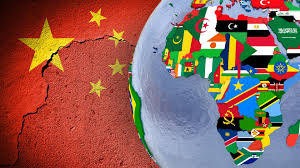China's push into Africa with loans, Aids, training /guiding military and politicians which may turn Africa into communism and dictatorship or even communist style of democracy...... What are the benefits and drawbacks? By Hugo Keji

China's expanding influence in Africa, through its loans, infrastructure projects, military training, and political engagement, raises various questions and concerns about the potential outcomes, including fears of promoting authoritarianism or undermining democratic governance.
Here are several key points to consider:
1. Economic Influence and Loans:
China's Belt and Road Initiative (BRI) has led to significant investment in African infrastructure, including roads, railways, and ports. While this investment is welcomed by many African governments, the debt trap diplomacy concern has been raised, where countries struggle to repay loans, giving China leverage over local policies and assets. This can shift the balance of power, potentially favoring autocratic regimes that align with Chinese interests.
Criticism: Many critics argue that the loans are opaque, often benefiting elites rather than the broader population, reinforcing existing undemocratic systems. There's a fear that countries heavily indebted to China could become politically dependent, limiting their sovereignty and democratic processes.
2. Military Training and Security Cooperation:
China has increased its military engagement in Africa through training programs, arms sales, and participation in peacekeeping operations. While China frames these efforts as part of broader peace and security cooperation, concerns arise that authoritarian leaders may use Chinese training and technology to suppress dissent or secure their hold on power.
Influence on Governance: China's non-interference policy in the internal affairs of other nations, combined with military cooperation, may embolden authoritarian leaders who value external support without pressure for democratic reforms. China’s model of governance, which emphasizes stability and economic growth over political liberalization, may appeal to leaders interested in consolidating power.
AfriPrime App link: FREE to download...
https://www.amazon.com/Africircle-AfriPrime/dp/B0D2M3F2JT
3. Political Guidance and Leadership Training:
China has been hosting African politicians and bureaucrats for leadership training, sharing lessons from the Chinese Communist Party’s governance model. While these programs focus on development and governance, the implicit message of strong central control, emphasis on economic over political freedoms, and a top-down approach to decision-making could appeal to African leaders with authoritarian leanings.
Impact on Democracy: This type of engagement may normalize a governance style that prioritizes state control and diminishes political opposition or civil society influence. African leaders who attend these programs may adopt aspects of China’s one-party system or its focus on centralizing political power.
4. Aid and Development Assistance:
China has provided significant aid to African countries, often with fewer political conditions compared to Western donors, who typically emphasize human rights, governance reforms, or democratic processes. While this makes Chinese aid attractive to many African countries, it can also reduce incentives for democratic reforms.
Potential for Dictatorship: Without the pressure to democratize, leaders may become more entrenched, relying on Chinese financial and political support to maintain power. This could, in some cases, encourage a shift toward more authoritarian governance structures, especially if the state controls key economic sectors with Chinese backing.
5. Impact on Ideology:
While China’s modern engagement in Africa isn’t explicitly ideological in terms of promoting communism, its model of authoritarian capitalism is seen by some as a counterweight to Western democratic ideals. The Chinese model may appeal to African leaders seeking economic development without liberal democratic pressures, potentially leading to a governance shift toward centralized, authoritarian control rather than multi-party democracy.
Conclusion:
While China's engagement in Africa isn’t explicitly aimed at spreading communism, its focus on stability, economic development, and non-interference in political affairs could indirectly encourage authoritarianism. Leaders may adopt aspects of China's governance style, prioritizing centralized control and economic development over democratic reforms. However, whether this leads to dictatorship depends largely on internal dynamics within African countries, the choices of their leaders, and how local populations respond to these influences.
Africa’s future governance trajectory will likely be shaped by a mix of Chinese influence, internal politics, and responses from other international actors like the U.S. and Europe. Whether this leads to more authoritarian regimes or remains a diverse political landscape remains an open question.
AfriPrime App link: FREE to download...
- Questions and Answers
- Opinion
- Story/Motivational/Inspiring
- Technology
- Art
- Causes
- Crafts
- Dance
- Drinks
- Film/Movie
- Fitness
- Food
- Games
- Gardening
- Health
- Home
- Literature
- Music
- Networking
- Other
- Party
- Religion
- Shopping
- Sports
- Theater
- Wellness
- News
- Culture
- War machines and policy

